剑桥少儿英语二级语法点
剑桥少儿英语二级知识点
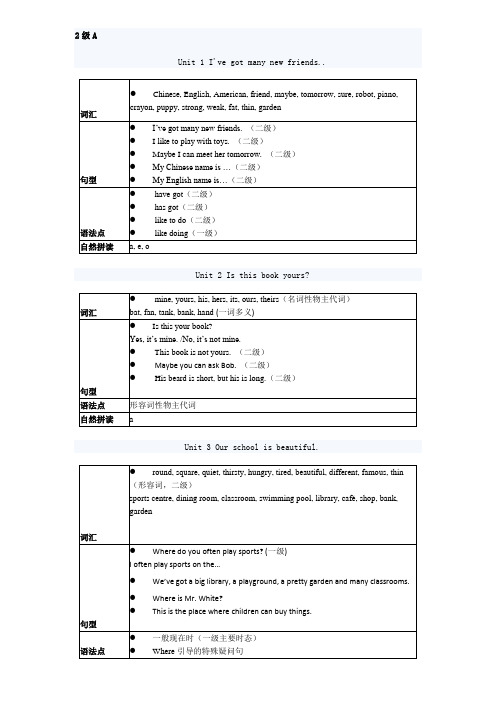
2级AUnit 1 I've got many new friends..Unit 2 Is this book yours?Unit 3 Our school is beautiful.Unit 4 Miss, can I ask you a question?Unit 5 How about coming with us?Unit 6 He likes reading picture books.Unit 7 You mustn't drop litter in the park!Unit 8 Who is the winner?Unit 9 Sally is taller than Ben.Unit 10 Did you know?Unit 11 I went to the zoo yesterday.Unit 12 Has your school got a swimming pool?Unit 13 My seven daysUnit 14 How often does he have sports?Unit 15 I enjoy reading picture stories!Unit 16 Winter funUnit 1 Going to different placesUnit 2 What's the weather like today?Unit 3 Let's play doctors.Unit 4 I can see with my eyes.Unit 5 Simon Paul lives in the country.Unit 6 I'd like a glass of water.Unit 7 I've got to go and see!Unit 8 Who is the first?2级BUnit 9 I like sunny days but I don't like rainy days.Unit 10 Let's guess.Unit 11 What's your hobby?Unit 12 Animals are our good friends.Unit 13 I can spot the frog, can you?Unit 14 There isn't any bread in the kitchen!Unit 15 Let's find it quickly!Unit 16 He can do better than his brother!。
(完整版)剑桥少儿英语二级(重点单词、句型)
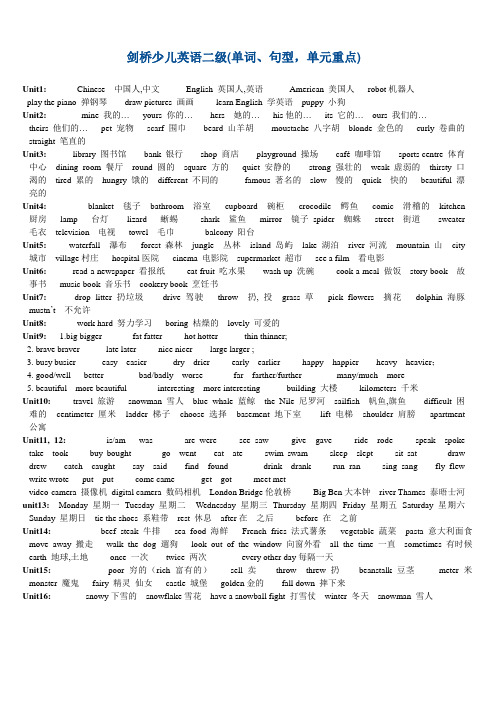
剑桥少儿英语二级(单词、句型,单元重点)Unit1:Chinese 中国人,中文English 英国人,英语American 美国人robot机器人play the piano 弹钢琴draw pictures 画画learn English 学英语puppy 小狗Unit2: mine 我的…yours 你的…hers 她的…his他的…its 它的…ours 我们的…theirs 他们的…pet 宠物scarf 围巾beard 山羊胡moustache 八字胡blonde 金色的curly 卷曲的straight 笔直的Unit3:library 图书馆bank 银行shop 商店playground 操场café咖啡馆sports centre 体育中心dining room 餐厅round 圆的square 方的quiet 安静的strong 强壮的weak 虚弱的thirsty 口渴的tired 累的hungry 饿的different 不同的famous 著名的slow 慢的quick 快的beautiful 漂亮的Unit4: blanket 毯子bathroom 浴室cupboard 碗柜crocodile 鳄鱼comic 滑稽的kitchen 厨房lamp 台灯lizard 蜥蜴shark 鲨鱼mirror 镜子spider 蜘蛛street 街道sweater 毛衣television 电视towel 毛巾balcony 阳台Unit5:waterfall 瀑布forest 森林jungle 丛林island 岛屿lake 湖泊river 河流mountain 山city 城市village村庄hospital医院cinema 电影院supermarket 超市see a film 看电影Unit6:read a newspaper 看报纸eat fruit 吃水果wash up 洗碗cook a meal 做饭story book 故事书music book 音乐书cookery book 烹饪书Unit7: drop litter 扔垃圾drive 驾驶throw 扔, 投grass 草pick flowers 摘花dolphin 海豚mustn’t 不允许Unit8: work hard 努力学习boring 枯燥的lovely 可爱的Unit9: 1.big bigger fat fatter hot hotter thin thinner;2. brave braver late later nice nicer large larger ;3. busy busier easy easier dry drier early earlier happy happier heavy heavier;4. good/well better bad/badly worse far farther/further many/much more5. beautiful more beautiful interesting more interesting building 大楼kilometers 千米Unit10:travel 旅游snowman 雪人blue whale 蓝鲸the Nile 尼罗河sailfish 帆鱼,旗鱼difficult 困难的centimeter 厘米ladder 梯子choose 选择basement 地下室lift 电梯shoulder 肩膀apartment 公寓Unit11, 12: is/am was are were see saw give gave ride rode speak spoke take took buy bought go went eat ate swim swam sleep slept sit sat draw drew catch caught say said find found drink drank run ran sing sang fly flew write wrote put put come came get got meet metvideo-camera 摄像机digital camera 数码相机London Bridge伦敦桥Big Ben大本钟river Thames 泰晤士河unit13:Monday 星期一Tuesday星期二Wednesday星期三Thursday 星期四Friday 星期五Saturday星期六Sunday 星期日tie the shoes 系鞋带rest 休息after在---之后before 在---之前Unit14: beef steak 牛排sea food 海鲜French fries 法式薯条vegetable 蔬菜pasta 意大利面食move away 搬走walk the dog 遛狗look out of the window 向窗外看all the time 一直sometimes 有时候earth 地球,土地once 一次twice 两次every other day每隔一天Unit15: poor 穷的(rich 富有的)sell 卖throw threw 扔beanstalk 豆茎meter 米monster 魔鬼fairy 精灵仙女castle 城堡golden金的fall down 摔下来Unit16: snowy下雪的snowflake雪花have a snowball fight 打雪仗winter 冬天snowman 雪人Unit1: village 村庄countryside 郊区field 田地shop 购物(动词) get on 上(车) get off 下(车) arrive in 到达+大地点arrive at 到达+小地点at the foot of the mountain 在山脚下set out 出发slow down 减速慢下来proud 骄傲的,自豪的people 人(集体名词) surprised 惊讶的Unit2:sunny 晴天的rainy 雨天的cloudy 多云的windy 刮风的foggy 有雾的stormy 暴雨的rainbow彩虹weather天气play with sand on the beach 在沙滩上玩沙子sunset 日落bicycle=bike cycling 骑自行车Unit3: a headache 头疼an earache耳朵疼 a toothache 牙疼 a backache 背疼 a stomachache 肚子疼have a cold 感冒 a cough咳嗽 a fever 高烧(run a temperature 发高烧)sweet food 甜食 a bad tooth 一颗蛀牙pull out 拔出(pull up拔起)lunch time 午饭时间last night 昨天晚上all night 一整晚medicine 药feel 感觉(How do you feel now?)brush teeth刷牙Unit4:dolphin 海豚starfish 海星crab 螃蟹smell 闻sound听taste尝look看tongue舌头washing powder洗衣粉soup 汤(复习所有身体部位单词)Unit5: cousin 唐表兄弟,唐表姐妹weekend 周末picnic野炊breathe 呼吸outside 外面Unit6: a bowl of 一碗 a bag of 一包 a box of 一箱 a carton of 一纸盒 a bottle of 一瓶 a cup of 一杯 a glass of 一玻璃杯 a bar of 一块 a pair of 一双一副 a kilo of 一公斤half a kilo of 一斤Unit7: clown 小丑interesting 有趣的exciting 兴奋的激动人心的gift =present 礼物Unit8: first 第一second第二third第三forth第四fifth第五sixth第六seventh第七eighth第八ninth第九tenth 第十eleventh 第十一twel f th第十二thirteenth 第十三fourteenth 第十四fifteenth 第十五sixteenth第十六seventeenth第十七eighteenth第十八nineteenth 第十九twent ie th第二十twenty-first 第二十一thirtieth 第三十fort ie th 第四十fift ie th 第五十sixt ie th 第六十sevent ie th 第七十eight ie th 第八十ninet ie th 第九十hundredth 第一百press 按button 纽扣按钮elevator 电梯(lift)choose chose 选择Unit9:sunbathe 进行日光浴yummy 美味的cute 可爱的woe 悲哀,悲痛bonny 可爱的,姣美的Unit10:pirate 海盗treasure 财富,财宝lose lost 丢失pick up 捡起know knew 知道find 找到look for 寻找rock 岩石stone石头Unit11:hobby 爱好New Zealand新西兰Africa 非洲bone 骨头chew 咀嚼paw (有爪动物的)脚掌swallow吞咽燕子Unit12:invite邀请kitten 小猫fox 狐狸useful 有用的anything 任何事naughty 淘气的trunk 树干wave 波浪,挥动,挥手quickly快速地Unit13, 14:spot看出run along 沿着---跑underground地下的,地铁ticket 票understand懂,明白push 推happen 发生no problem 没问题Unit15:walk slowly 慢慢地走sing happily 开心地唱dance beautifully跳得很优美run quickly= run fast 跑得块write carefully 仔细地写sit quietly 安静地坐着behave badly 表现很糟speak loudly 大声地讲话draw differently 画得不一样pond kit 鱼缸套装spoon 勺子race 赛跑,竞赛(速度上) cost 花费money钱dinner 正餐(一般是晚餐) ring the bell 打铃Unit16:dart 标枪,飞镖fair 公平的opposite 对立的,相对的,反义词score 得分round 一轮,一圈double两倍(名,动,形容) miss 失去,错过,思念sleepy 瞌睡的early 早的clip 回形针,夹子,别针space 空间,距离spaceship 宇宙飞船fix固定,安装wheel 车轮, 轮子剑桥少儿英语二级必须掌握的内容上册Unit one基本句型:I’ve got many new frie ndsThey are so lovelyMaybe I can meet her tomorrowI like to play with toysMy Chinese name is “Zhou Changcheng”My English name is “Ann”Please give it to me.Can I help you with the bag?重点朗读词汇:Chinese, English, friend, American, maybe, tomorrow, sure, robot, piano, crayon, puppy, Alex, strong, weak, fat, thin, garden重点记忆内容:单词:Chinese, English, American, robot, piano, crayon, strong, weak, fat, thin,句型: 见第3页的第5部分需要学生记忆家庭作业:1、练习基本句型,跟读磁带把第4页的第7部分读熟直至能背下来。
剑桥少儿英语二级Unit2(A)
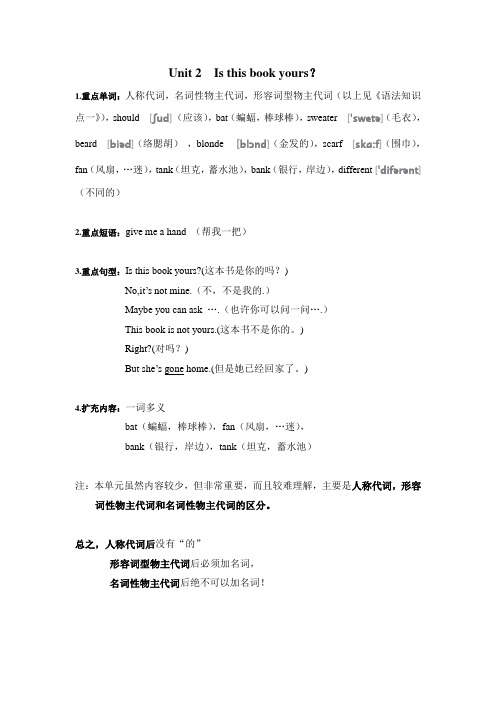
Unit 2 Is this book yours?
1.重点单词:人称代词,名词性物主代词,形容词型物主代词(以上见《语法知识点一》),should [ʃud] (应该),bat(蝙蝠,棒球棒),sweater [ˈswetə](毛衣),beard [biəd](络腮胡),blonde[blɔnd](金发的),scarf [skɑ:f](围巾),fan(风扇,…迷),tank(坦克,蓄水池),bank(银行,岸边),different [ˈdifərənt] (不同的)
2.重点短语:give me a hand (帮我一把)
3.重点句型:Is this book yours?(这本书是你的吗?)
No,it’s not mine.(不,不是我的.)
Maybe you can ask ….(也许你可以问一问….)
This book is not yours.(这本书不是你的。
)
Right?(对吗?)
But she’s gone home.(但是她已经回家了。
)
4.扩充内容:一词多义
bat(蝙蝠,棒球棒),fan(风扇,…迷),
bank(银行,岸边),tank(坦克,蓄水池)
注:本单元虽然内容较少,但非常重要,而且较难理解,主要是人称代词,形容词性物主代词和名词性物主代词的区分。
总之,人称代词后没有“的”
形容词型物主代词后必须加名词,
名词性物主代词后绝不可以加名词!。
剑桥少儿英语二级下册复习知识清单
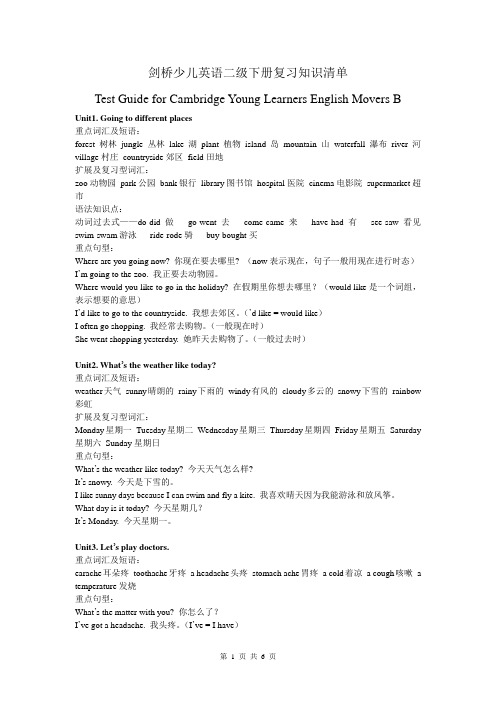
剑桥少儿英语二级下册复习知识清单Test Guide for Cambridge Young Learners English Movers BUnit1. Going to different places重点词汇及短语:forest树林jungle丛林lake湖plant植物island岛mountain山waterfall瀑布river河village村庄countryside郊区field田地扩展及复习型词汇:zoo动物园park公园bank银行library图书馆hospital医院cinema电影院supermarket超市语法知识点:动词过去式——do-did做go-went去come-came来have-had有see-saw看见swim-swam游泳ride-rode骑buy-bought买重点句型:Where are you going now? 你现在要去哪里? (now表示现在,句子一般用现在进行时态)I’m going to the zoo. 我正要去动物园。
Where would you like to go in the holiday? 在假期里你想去哪里?(would like是一个词组,表示想要的意思)I’d like to go to the countryside. 我想去郊区。
(’d like = would like)I often go shopping. 我经常去购物。
(一般现在时)She went shopping yesterday. 她昨天去购物了。
(一般过去时)Unit2. What’s the weather like today?重点词汇及短语:weather天气sunny晴朗的rainy下雨的windy有风的cloudy多云的snowy下雪的rainbow 彩虹扩展及复习型词汇:Monday星期一Tuesday星期二Wednesday星期三Thursday星期四Friday星期五Saturday 星期六Sunday星期日重点句型:What’s the weather like today? 今天天气怎么样?It’s snowy. 今天是下雪的。
剑桥少儿英语二级重点汇总

十一、句型问答
1. What do you like to do ? What do you like doing ? What doe she like to do ? What does he like doing?
2. Who is she? Who is he? Who is the boy? Who is the girl? Who is the man?
5. 不规则变化
• 2. 不可数名词 不可数名词则没有复数形式,但可用一 些容器表示不可数名词的量。 例:一杯茶 a cup of tea 一杯奶 a glass of milk 一瓶水/果汁 a bottle of water / juice 一碗汤 a bowl of soup
数词
三、数词
基数词:表示数目 How many...?
hers) • 6. ______ is my best friend. (She / Hers)
七、天气
• What's the weather like today?
It's sunny / rainy / cloudy / windy / snowy. There is a rainbow.
What can you do in the city? What can you do in the country?
• visit a zoo • play sports games • go to the park • see the film • visit friends • meet lots of people • go to the market
序数词:表示顺序,词前一定要加the
序数词怎样得来? 与基数词有怎样的关系? 特有的字母符号是什么?-th[θ]
(完整版)剑桥少儿英语二级语法点
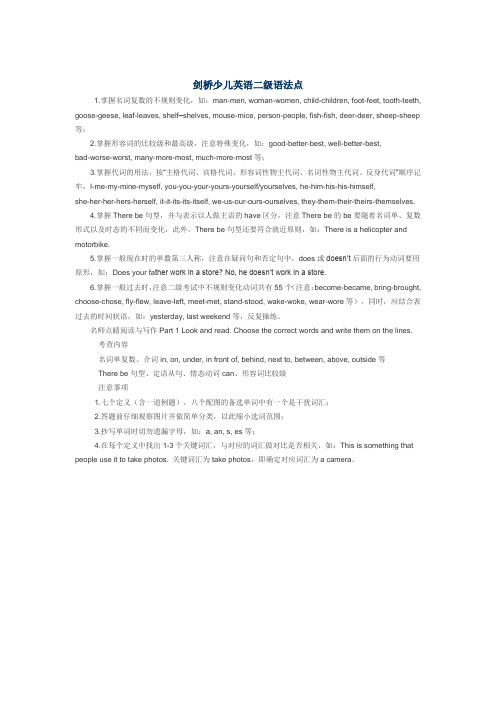
剑桥少儿英语二级语法点1.掌握名词复数的不规则变化,如:man-men, woman-women, child-children, foot-feet, tooth-teeth, goose-geese, leaf-leaves, shelf–shelves, mouse-mice, person-people, fish-fish, deer-deer, sheep-sheep 等;2.掌握形容词的比较级和最高级,注意特殊变化,如:good-better-best, well-better-best,bad-worse-worst, many-more-most, much-more-most等;3.掌握代词的用法,按“主格代词、宾格代词、形容词性物主代词、名词性物主代词、反身代词”顺序记牢,I-me-my-mine-myself, you-you-your-yours-yourself/yourselves, he-him-his-his-himself,she-her-her-hers-herself, it-it-its-its-itself, we-us-our-ours-ourselves, they-them-their-theirs-themselves.4.掌握There be句型,并与表示以人做主语的have区分,注意There be的be要随着名词单、复数形式以及时态的不同而变化,此外,There be句型还要符合就近原则,如:There is a helicopter and motorbike.5.掌握一般现在时的单数第三人称,注意在疑问句和否定句中,does或doesn’t后面的行为动词要用原形,如:Does your fa ther work in a store? No, he doesn’t work in a store.6.掌握一般过去时,注意二级考试中不规则变化动词共有55个(注意:become-became, bring-brought, choose-chose, fly-flew, leave-left, meet-met, stand-stood, wake-woke, wear-wore等),同时,应结合表过去的时间状语,如:yesterday, last weekend等,反复操练。
剑桥少儿英语二级重点单词句型

剑桥少儿英语二级重点单词句型Title: Key Words and Sentence Patterns for Cambridge Young Learners English Level 2Introduction:Cambridge Young Learners English (YLE) Level 2 aims to provide young learners with a solid foundation in English vocabulary and sentence patterns. This article will explore the key words and sentence patterns that are crucial for mastering the YLE Level 2 curriculum. By understanding and practicing these words and sentence structures, young learners can improve their English proficiency and excel in their language studies.1. Nouns and Pronouns:Nouns and pronouns play a fundamental role in constructing meaningful sentences. In YLE Level 2, learners should be familiar with basic nouns such as "cat," "dog," "book," and "toy." They should also understand how to use pronouns like "he," "she," "it," and "they" correctly in sentences.2. Verbs and Verb Tenses:Verbs are the action words that bring life to sentences. YLE Level 2 introduces young learners to essential verbs such as "eat," "drink," "run," and "play." Additionally, learners should grasp the basic concept of verb tenses, including the present tense (e.g., "I eat ice cream") and the past tense (e.g., "She played in the park").3. Adjectives and Adverbs:Adjectives describe nouns and add details to sentences. In YLE Level 2, learners should become familiar with adjectives like "big," "small," "happy," and "sad." Adverbs modify verbs and provide additional information about how an action is performed. Examples of adverbs include "quickly," "slowly," "happily," and "sadly."4. Prepositions:Prepositions indicate the relationship between nouns or pronouns and other elements in a sentence. Common prepositions covered in YLE Level 2 include "in," "on," "under," "next to," and "between." Understanding prepositions is crucial for young learners to express direction, location, and time.5. Question Forms:Forming questions is an essential skill in English communication. In YLE Level 2, learners should learn how to ask simple questions using question words like "what," "where," "who," and "how." For example, "What is your favorite color?" or "Where do you live?"6. Imperatives and Requests:Imperatives and requests help young learners express their desires or give instructions. It is important for YLE Level 2 students to practice forming imperatives, such as "Open the door" or "Turn off the lights." They should also learn how to make polite requests using phrases like "Can you please pass me the pen?"7. Expressing Likes and Dislikes:Expressing preferences is another crucial aspect of communication. In YLE Level 2, learners should understand how to express their likes and dislikes using sentences like "I like ice cream" or "She doesn't like broccoli." This enables them to express their opinions and engage in simple conversations.8. Describing Daily Routines:Daily routines are common topics for young learners. YLE Level 2 covers basic sentence patterns to describe daily activities, such as "I brush my teeth in the morning" or "She takes a bath before bedtime." These sentence structures enable learners to describe their own routines and understand others.Conclusion:Mastering the key words and sentence patterns in YLE Level 2 is essential for young learners to develop their English language skills. By acquiring a solid foundation in vocabulary and grammar, students can enhance their overall language proficiency and build a strong basis for future learning. Regular practice and exposure to English in various contexts will contribute to their success in the Cambridge Young Learners English program.。
剑桥少儿英语二级主要句型
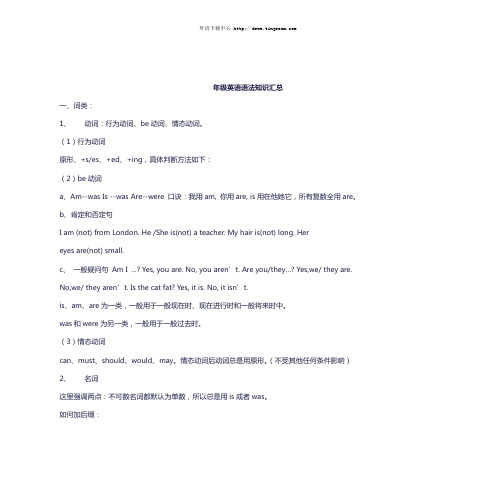
年级英语语法知识汇总一、词类:1、动词:行为动词、be动词、情态动词。
(1)行为动词原形、+s/es、+ed、+ing,具体判断方法如下:(2)be动词a、Am--was Is --was Are--were 口诀:我用am, 你用are, is用在他她它,所有复数全用are。
b、肯定和否定句I am (not) from London. He /She is(not) a teacher. My hair is(not) long. Hereyes are(not) small.c、一般疑问句Am I …? Yes, you are. No, you aren’t. Are you/they…? Yes,we/ they are. No,we/ they aren’t. Is the cat fat? Yes, it is. No, it isn’t.is、am、are为一类,一般用于一般现在时、现在进行时和一般将来时中。
was和were为另一类,一般用于一般过去时。
(3)情态动词can、must、should、would、may。
情态动词后动词总是用原形。
(不受其他任何条件影响)2、名词这里强调两点:不可数名词都默认为单数,所以总是用is或者was。
如何加后缀:a.一般情况下,直接加-s,如:book-books, bag-bags, cat-cats, bed-bedsb.以s. x. sh. ch结尾,加-es,如:bus-buses, box-boxes, brush-brushes, watch-watchesc.以“辅音字母+y”结尾,变y为i, 再加-es,如:family-families, strawberry-strawberriesd.以“f或fe”结尾,变f或fe为v, 再加-es,如:knife-knivese.不规则名词复数:man-men, woman-women, policeman-policemen, policewoman-policewomen, mouse-mice child-children foot-feet ,.tooth-teeth fish-fish, people-people,Chinese-Chinese, Japanese-Japanese3、形容词(包括副词)形容词表示某一事物或的特征,副词表示某一动作的特征。
- 1、下载文档前请自行甄别文档内容的完整性,平台不提供额外的编辑、内容补充、找答案等附加服务。
- 2、"仅部分预览"的文档,不可在线预览部分如存在完整性等问题,可反馈申请退款(可完整预览的文档不适用该条件!)。
- 3、如文档侵犯您的权益,请联系客服反馈,我们会尽快为您处理(人工客服工作时间:9:00-18:30)。
剑桥少儿英语二级语法点
1.掌握名词复数的不规则变化,如:man-men, woman-women, child-children, foot-feet, tooth-teeth, goose-geese, leaf-leaves, shelf–shelves, mouse-mice, person-people, fish-fish, deer-deer, sheep-sheep 等;
2.掌握形容词的比较级和最高级,注意特殊变化,如:good-better-best, well-better-best,
bad-worse-worst, many-more-most, much-more-most等;
3.掌握代词的用法,按“主格代词、宾格代词、形容词性物主代词、名词性物主代词、反身代词”顺序记牢,I-me-my-mine-myself, you-you-your-yours-yourself/yourselves, he-him-his-his-himself,
she-her-her-hers-herself, it-it-its-its-itself, we-us-our-ours-ourselves, they-them-their-theirs-themselves.
4.掌握There be句型,并与表示以人做主语的have区分,注意There be的be要随着名词单、复数形式以及时态的不同而变化,此外,There be句型还要符合就近原则,如:There is a helicopter and motorbike.
5.掌握一般现在时的单数第三人称,注意在疑问句和否定句中,does或doesn’t后面的行为动词要用原形,如:Does your fa ther work in a store? No, he doesn’t work in a store.
6.掌握一般过去时,注意二级考试中不规则变化动词共有55个(注意:become-became, bring-brought, choose-chose, fly-flew, leave-left, meet-met, stand-stood, wake-woke, wear-wore等),同时,应结合表过去的时间状语,如:yesterday, last weekend等,反复操练。
名师点睛阅读与写作Part 1 Look and read. Choose the correct words and write them on the lines.
考查内容
名词单复数、介词in, on, under, in front of, behind, next to, between, above, outside等
There be句型、定语从句、情态动词can、形容词比较级
注意事项
1.七个定义(含一道例题),八个配图的备选单词中有一个是干扰词汇;
2.答题前仔细观察图片并做简单分类,以此缩小选词范围;
3.抄写单词时切勿遗漏字母,如:a, an, s, es等;
4.在每个定义中找出1-3个关键词汇,与对应的词汇做对比是否相关,如:This is something that people use it to take photos. 关键词汇为take photos,即确定对应词汇为a camera。
